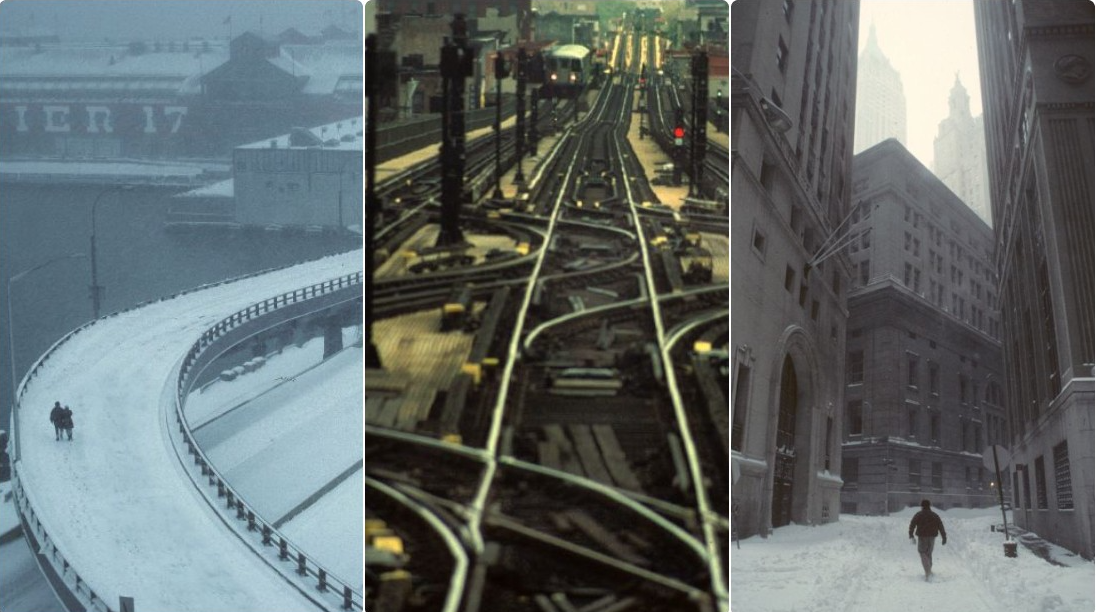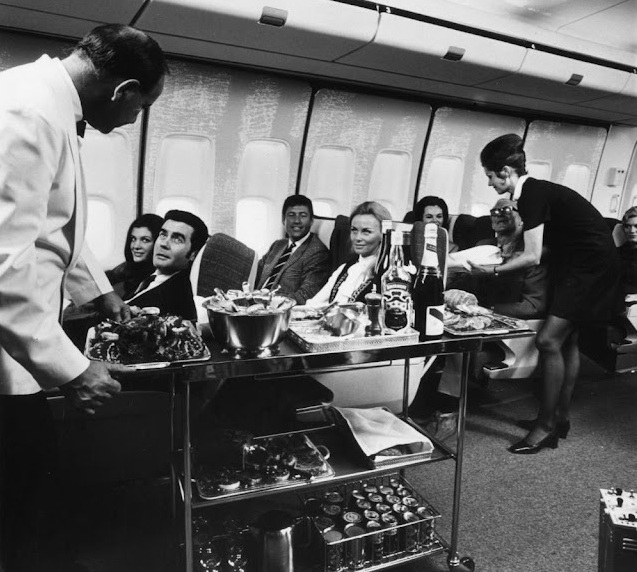Military and political events overseas were not the only subjects reporters and photographers covered during World War II. Photographer Esther Bubley (1921-1998) found ample subject matter to explore on the American home front as the nation mobilized for war.
Twenty-year-old Bubley arrived in Washington, D.C., in 1941, fresh from art school and a short stint with Vogue and eager to earn a living with her camera. Although she soon found work as a lab technician at the National Archives, Bubley's ambition was to work for Roy Stryker. Stryker, head of the documentary photography project of the Historical Section, Farm Security Administration (FSA) Documentary Photo project from 1935 to 1943, was an outstanding mentor and teacher, who attracted young photographers to work for him.
During her off-hours, Bubley set out to prove her camera skills by snapping wartime subjects around the nation's capital. Her unvarnished images of life in the city's boarding houses for war workers impressed Stryker enough to recruit the aspiring photographer into the Office of War Information (OWI), where the Historical Section had been relocated.
OWI sent Bubley on at least one cross-country bus trip, during which she produced hundreds of images of a country in transition from the doldrums of the Great Depression to the fevered pace of war. Unlike many of her colleagues, however, Bubley was not drawn to the awesome industrial complex spawned by the war, preferring instead to focus on average Americans.
“Put me down with people, and it's just overwhelming,” Bubley said of her focus on the human dimension of mobilization.
A look at the American home front during the Second World War through Esther Bubley's lens in 1943.
 |
| Indiana. A soldier and a girl saying goodbye at the Greyhound bus station, Indianapolis, 1943 |
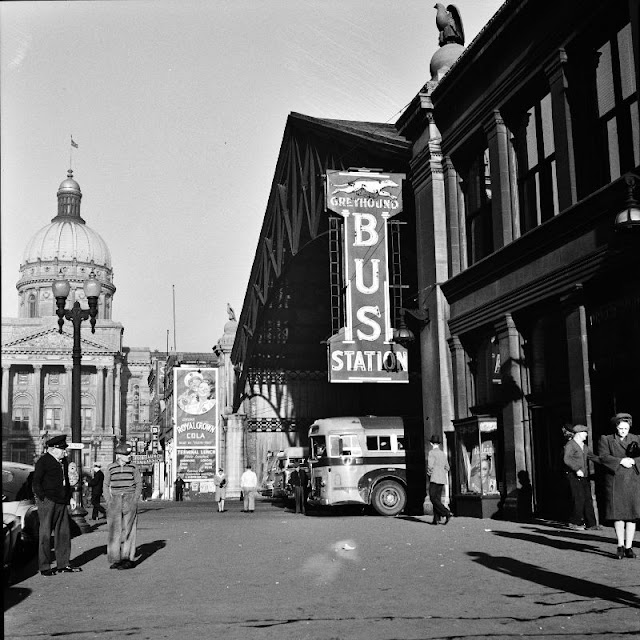 |
| Indiana. A Greyhound bus station in Indianapolis, 1943 |
 |
| Indiana. At the Greyhound bus terminal, Indianapolis, September 1943 |
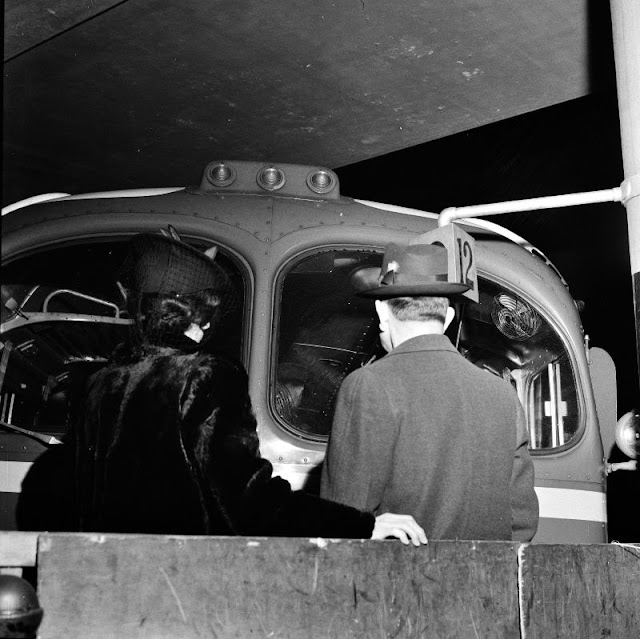 |
| Indiana. Parents of one of the soldiers on a special bus, climbing onto the baggage cart to look into the bus until the moment it departs from the Greyhound terminal, Indianapolis, 1943 |
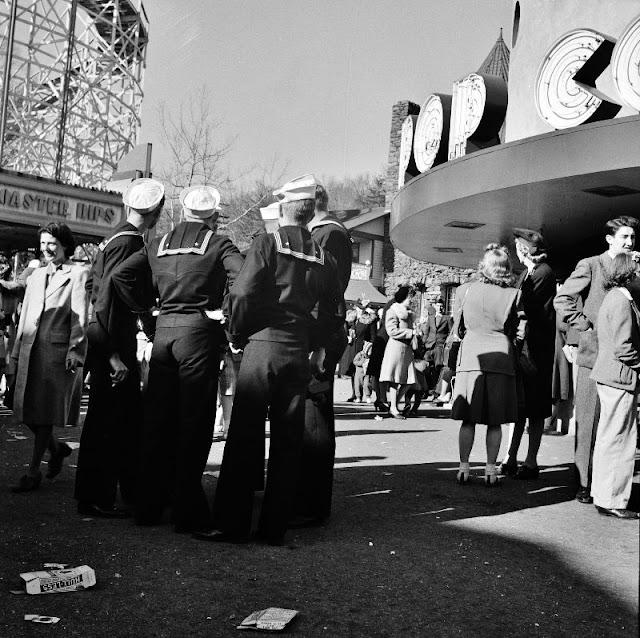 |
| Maryland. Sailors at Glen Echo amusement park, March 1943 |
 |
| Ohio. Lester Ward, a Greyhound bus driver, Columbus, September 1943 |
 |
| Ohio. Passengers in the waiting room of a bus station, Columbus, September 1943 |
 |
| Virginia. A girl in her room playing a phonograph at Arlington Farms, a residence for women who work in the government for the duration of the war, Arlington, June 1943 |
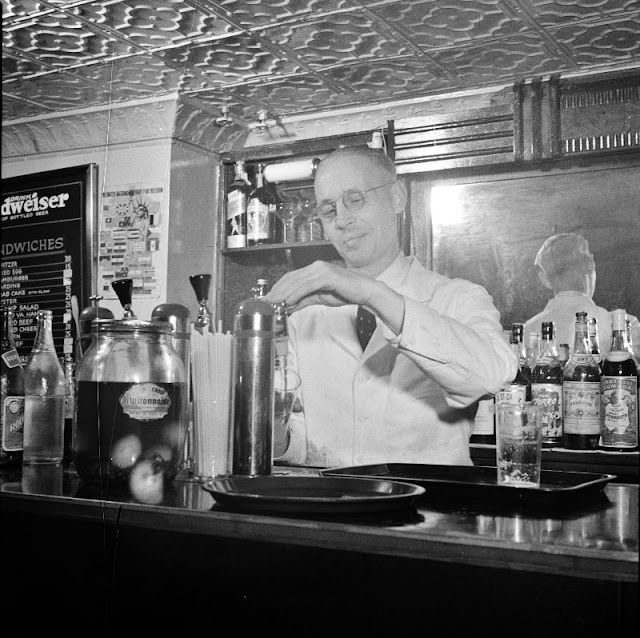 |
| Washington D.C. Bob, the bartender at the Sea Grill, 1943 |
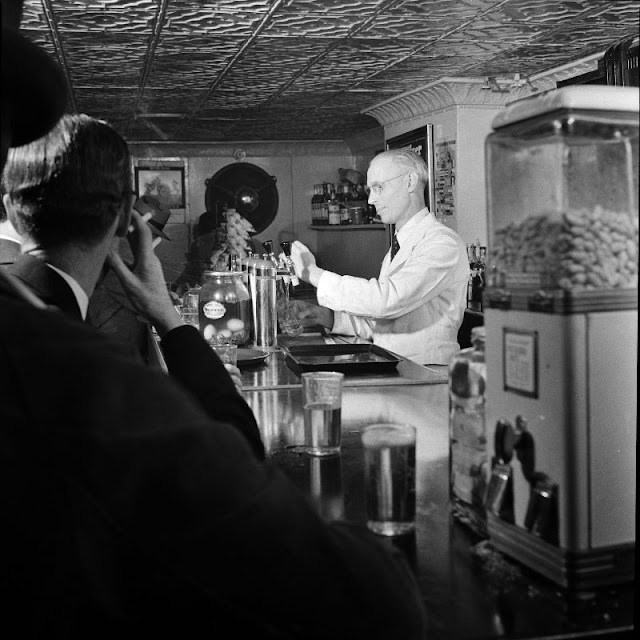 |
| Washington D.C. Bob, the bartender at the Sea Grill, 1943 |
 |
| Washington D.C. Girl sitting alone in the Sea Grill, a bar and restaurant, waiting for a pickup, April 1943 |
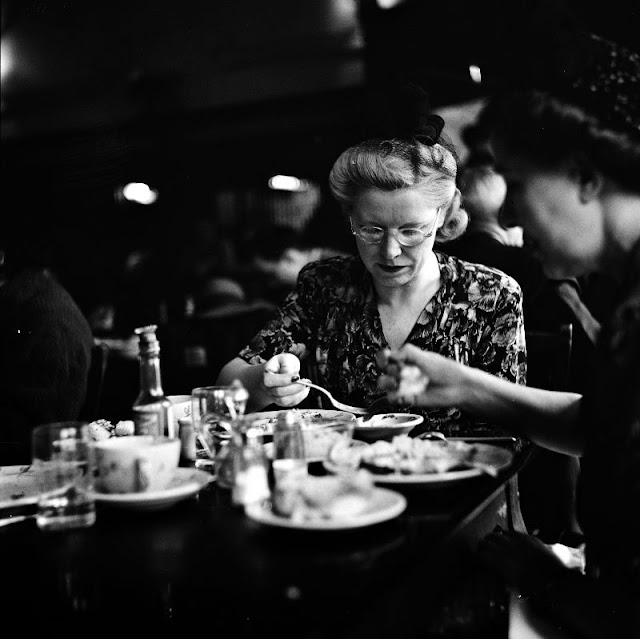 |
| Washington D.C. People in a cafeteria, April 1943 |
 |
| Washington DC. Riding on a streetcar, March 1943 |
 |
| Washington DC. Riding on a streetcar, March 1943 |
 |
| Washington DC. Riding on a streetcar, March 1943 |
 |
| Washington, D.C. A girl employed by the U.S. government, a new arrival at a boarding house, being greeted by her roommates, 1943 |
 |
| Washington, D.C. A slightly inebriated couple at the Sea Grill, April 1943 |
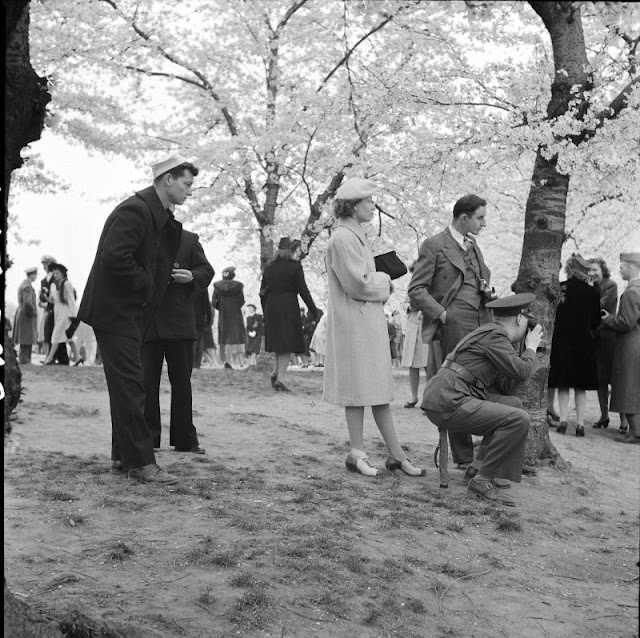 |
| Washington, D.C. Admiring the cherry blossoms, April 1943 |
 |
| Washington, D.C. After dinner, a bridge game goes on nightly in the largest room in the boarding house, January 1943 |
 |
| Washington, D.C. Beer drinkers at the Sea Grill, 1943 |
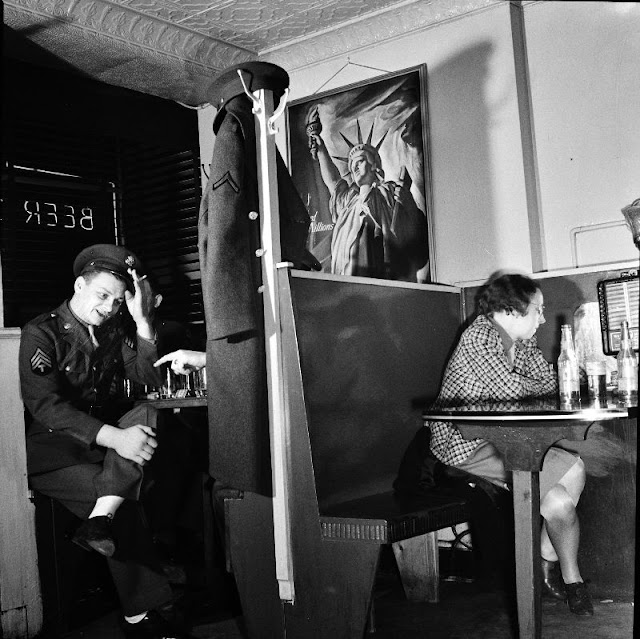 |
| Washington, D.C. Beer drinkers at the Sea Grill, 1943 |
 |
| Washington, D.C. Columns of the National Gallery of Art, March 1943 |
 |
| Washington, D.C. Girl and a soldier came into the Sea Grill separately, but are developing a beautiful friendship, 1943 |
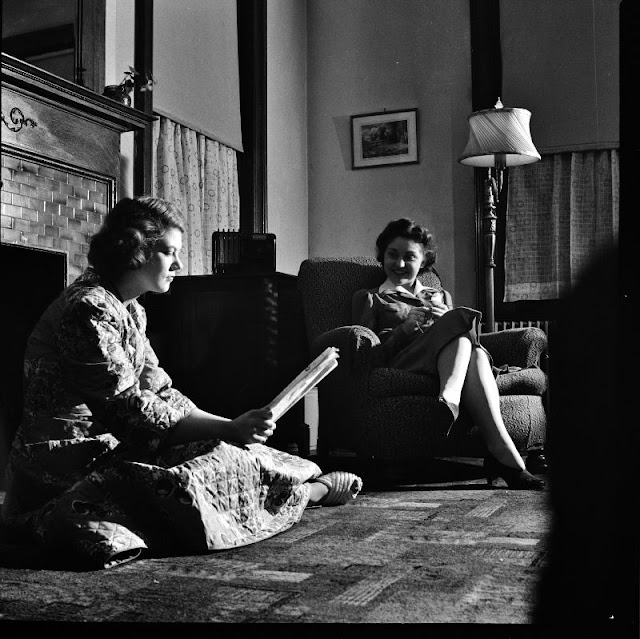 |
| Washington, D.C. Girls employed by the U.S. government in a room selected for them by the Office of Emergency Management (OEM) personnel service, March 1943 |
 |
| Washington, D.C. Little boy riding on a streetcar, 1943 |
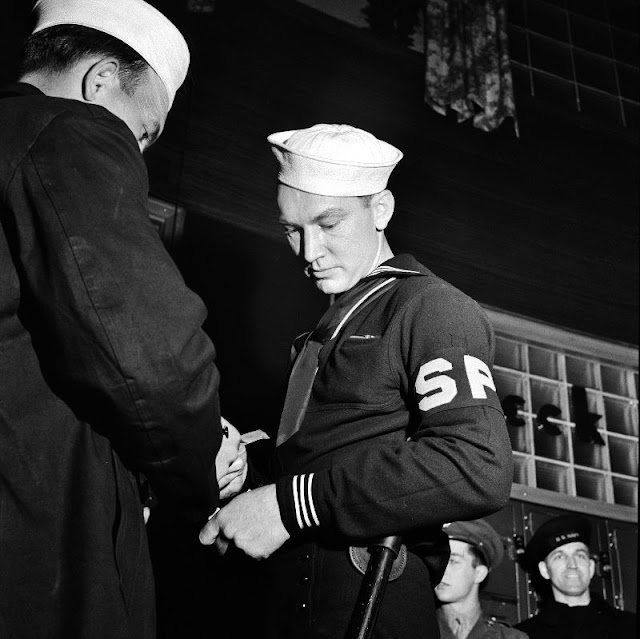 |
| Washington, D.C. Member of the Shore Patrol who helps get servicemen lined up and in order while waiting for special buses to leave the Greyhound bus terminal on Sunday evenings, April 1943 |
 |
| Washington, D.C. Member of the Shore Patrol who helps get servicemen lined up and in order while waiting for special buses to leave the Greyhound bus terminal on Sunday evenings, April 1943 |
 |
| Washington, D.C. Mrs. St. Ayr greeting a new girl employee of the U.S. government at the station, March 1943 |
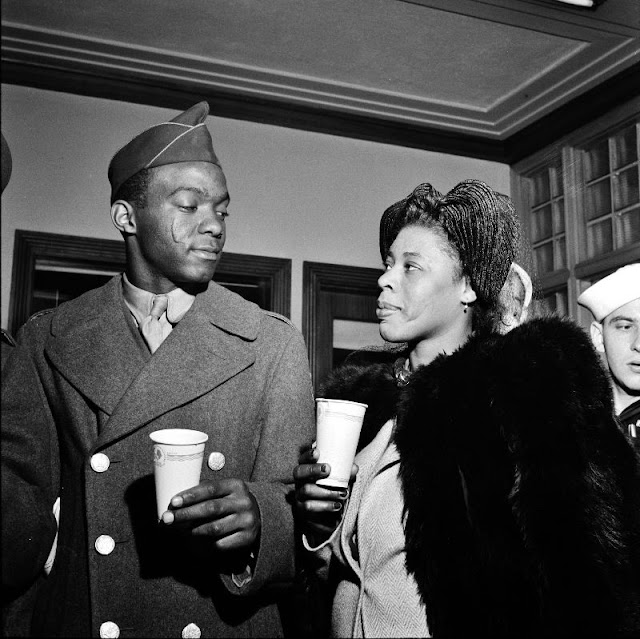 |
| Washington, D.C. Part of the line waiting to board one of the special buses for servicemen leaving the Greyhound terminal on Sunday nights, April 1943 |
 |
| Washington, D.C. Sailor reading in line while waiting to board a bus at the Greyhound terminal, April 1943 |
 |
| Washington, D.C. Soldier and a sailor on the steps of a monument in front of the Capitol on a Sunday, March 1943 |
 |
| Washington, D.C. Soldier buying a ticket at the Greyhound bus depot, April 1943 |
 |
| Washington, D.C. Soldier in front of the Capitol theatre, 1943 |
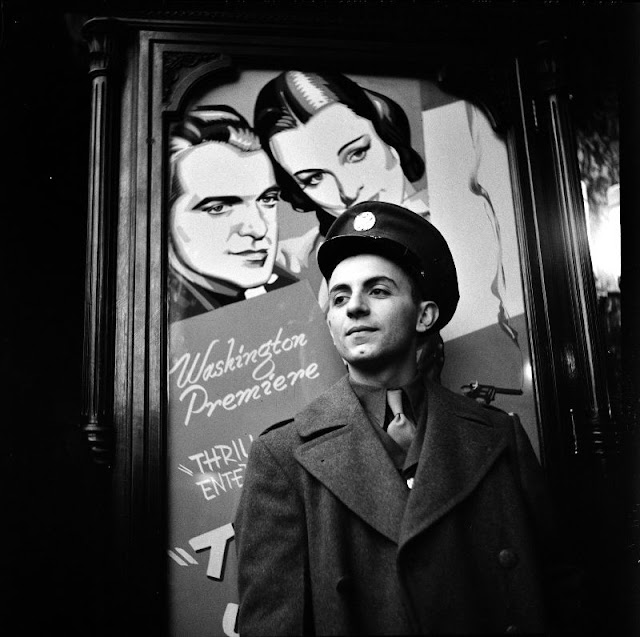 |
| Washington, D.C. Soldier in front of the Capitol theatre, 1943 |
 |
| Washington, D.C. Soldiers in front of the Capitol theatre, 1943 |
 |
| Washington, D.C. Soldiers looking out the window of the bus just before leaving the Greyhound terminal, 1943 |
 |
| Washington, D.C. Sue, a waitress at the Sea Grill serving beer, April 1943 |
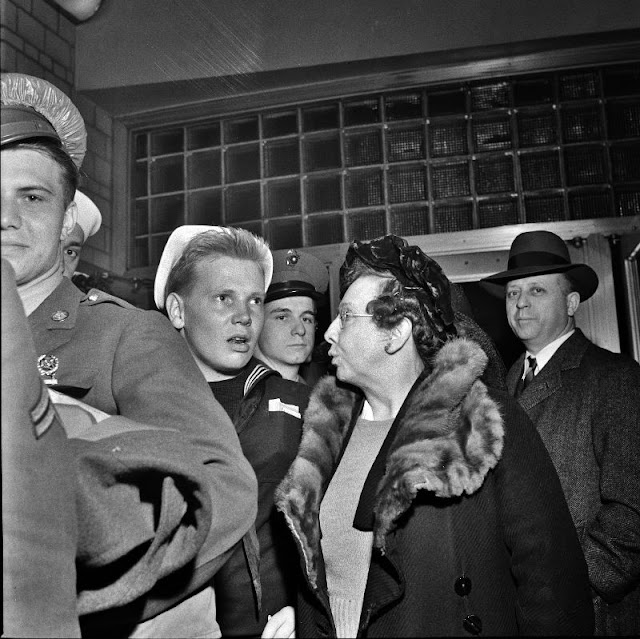 |
| Washington, D.C. Woman standing in line with her son until he leaves on the bus at the Greyhound bus depot, April 1943 |
 |
| A girl waiting for the bus by a road's edge. Greyhound bus trip from Louisville, Kentucky, to Memphis, Tennessee, and the terminals, September 1943 |
 |
| Miss Helen Ringwald works with the pneumatic tubes through which messages are sent to branches in other parts of the city of Washington D.C. for delivery, 1943 |

